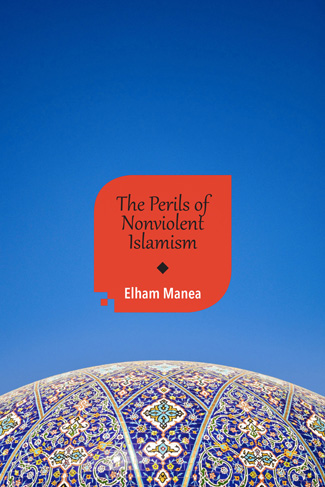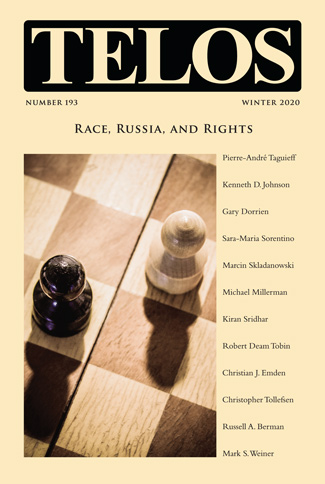By Wolfgang Thierse · Friday, March 12, 2021 The following essay was originally published in the Frankfurter Allgemeine Zeitung on February 22, 2021, and appears here in translation with permission of the author. Translated by Russell A. Berman, with comments here.
To read more in depth from Telos, subscribe to the journal here.
Community membership used to be a matter of religion and, after that, ideology. Today this function has been taken over by the concept of identity. Religion and ideology in the past led repeatedly to serious and even bloody conflicts. Will this history repeat itself under the new principle? Themes of cultural membership seem to be rattling our Western societies increasingly, splitting them along the political lines of distributive justice. Questions of identity—ethnic, gender, sexual—dominate, as the debates over racism, postcolonialism, and gender grow violent and aggressive. These are probably unavoidable confrontations in an increasingly pluralistic society, just as they give expression to social conflicts, fought over the distribution of visibility and influence, attention and recognition.
As unavoidable as these conflicts may seem, they are also confusing, opaque, and ambivalent. The violence of some attacks against traditionalist positions, as well as the violence in the defense of tradition, in addition to the radicalness of identity demands lead to the question: How much identity politics strengthens the pluralism of a society, and at what point does it turn into fragmentation? The principle at stake is this: the ethnic, cultural, and religious-worldview pluralism that is growing in Germany as elsewhere is no idyll; on the contrary it is full of disputes and conflict potential. If this multifacetedness is to be lived out in a peaceful manner, then pluralism must be more than the mere coexistence of minorities and identities that not only differ from each other but also separate from each other. Fundamental commonalities are necessary, including of course a common language, and naturally also a shared recognition of justice and law.
Continue reading →
By B. Venkat Mani · Friday, March 5, 2021 To read more in depth from Telos, subscribe to the journal here.
On February 2, the second day of Black History Month, a tweet from a Black woman in the United States unleashed a war of words in India, with global resonance. Rihanna, the Barbados-born U.S. singer, entrepreneur, philanthropist, and cultural activist posted a one-liner: “why aren’t we talking about this?!” with the hashtag #FarmersProtest and a link to a report about the government of India shutting down internet services in areas bordering the national capital, New Delhi, where farmers have been carrying out a movement to oppose three contentious farm laws.
Rihanna’s tweet went viral. The climate activist Greta Thunberg, Hollywood actor John Cusack, U.S.-based lawyer and supporter of Black Lives Matter Meena Harris, former adult star Mia Khalifa, Instagram influencer Amanda Cerny, R&B singer Jay Sean, and music composer Dr. Zeus all expressed support for the Indian farmers’ protests in their own independent tweets. Kisan Ekta Morcha, the official twitter account of the United Farmers’ Front, thanked Rihanna for her support of the movement, and countless Indians praised her for drawing international attention to the movement.
Continue reading →
By Telos Press · Monday, February 1, 2021 Now available from Telos Press Publishing: The Perils of Nonviolent Islamism, by Elham Manea. Order the paperback edition today in our online store and save 20% off the list price. Also available now in Kindle ebook format at Amazon.com. In today’s episode of the Telos Press Podcast, posted here, David Pan and Russell Berman talk with Elham Manea about her new book.
 The Perils of Nonviolent Islamism The Perils of Nonviolent Islamism
by Elham Manea
With a Foreword by Russell A. Berman
Elham Manea’s The Perils of Nonviolent Islamism describes the ways in which nonviolent forms of Islamist fundamentalism in European democracies lay the groundwork for Islamist terrorism. Through a persuasive mixture of autobiography, explanatory frameworks, case studies, personal interviews, and careful readings of source material, Manea details how Islamist groups have exploited the openness of democracies and multiculturalist attitudes in order to create closed Islamist communities. These groups today are transforming Islam in the West into a unified fundamentalist religion that ultimately promotes attitudes that lead to violence. Combining keen social theoretical analysis with critical self-reflection, Manea’s interrogation of Islamism sounds the alarm on a crisis that can no longer be ignored.
Continue reading →
By David Pan · Friday, December 18, 2020 Telos 193 (Winter 2020): Race, Russia, and Rights is now available for purchase in our store. Individual subscriptions to Telos are also available in both print and online formats.
 What is not up for discussion? The answer to this question defines a political order, and the repressiveness of such an order will depend on where this boundary is set between the discussable and the undiscussable. But it is not as if more discussion necessarily means less repression. Certain topics—genocide, torture, slavery—definitely need to be off the table as legitimate political measures. Other topics—the choosing of rulers and historical facts—need to be discussable in order to avoid tyranny. In between lies a gray area whose definition will establish the character of each political order. Conversely, a lack of consensus on this issue will lead to political instability that goes beyond the content of political debates, indicating that the question of discussability coincides with the problem of political identity. This issue of Telos will consider three areas in which discussability has become the main issue, leading to implacable conflict. What is not up for discussion? The answer to this question defines a political order, and the repressiveness of such an order will depend on where this boundary is set between the discussable and the undiscussable. But it is not as if more discussion necessarily means less repression. Certain topics—genocide, torture, slavery—definitely need to be off the table as legitimate political measures. Other topics—the choosing of rulers and historical facts—need to be discussable in order to avoid tyranny. In between lies a gray area whose definition will establish the character of each political order. Conversely, a lack of consensus on this issue will lead to political instability that goes beyond the content of political debates, indicating that the question of discussability coincides with the problem of political identity. This issue of Telos will consider three areas in which discussability has become the main issue, leading to implacable conflict.
Continue reading →
By Telos Press · Wednesday, August 26, 2020 The following interview was conducted by Moritz Schwarz and appeared in Junge Freiheit, on August 14, 2020. Published with permission. Translated by Russell A. Berman, who has written a separate note here.
Dr. Maaßen, the Mayor of Tübingen, Boris Palmer, has warned against a “world of prohibitions” in Germany, in which “moral condemnation” could follow the smallest mistake. This would “destroy liberal democracy.” Is he right?
Hans-Georg Maaßen: I am a jurist, out of passion, and that’s why I am frightened to have to agree with him in part. I am deeply concerned that our legal state—the rule of law—is being more and more undermined by the rule of morality.
Bärbel Bohley’s disappointed phrase is well known: “We wanted justice, but all we got is the rule of law.” Isn’t morality the better and ethically higher good?
Maaßen: No. It is true that the law only provides a moral minimum. Yet that is precisely the precondition of freedom.
Continue reading →
By Telos Press · Monday, July 20, 2020 The following interview was conducted by Alexander Wendt on July 5, 2020, and originally appeared in German on Tichys Einblick on July 13, 2020. Translated by Russell A. Berman.
Alexander Wendt: Professor Bolz, the costs of the coronavirus pandemic are still unknown, but they will surely leave deep scars for years to come. Will our society return from post-materialism to a society with hard materialist concerns with numbers and balance sheets?
Norbert Bolz: Even before the coronavirus crisis, I had doubts as to whether the notion of a post-material society made much sense. To my mind, the “post-material” term only makes real sense as a description of digitalization and the rise of information technology. But the superstructure that is usually meant by “post-material” seems to me to be mainly a substitute for religion, and it never had the real significance for society that many ascribe to it.
Continue reading →
|
|




